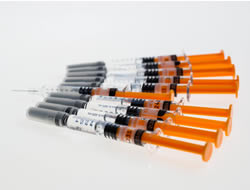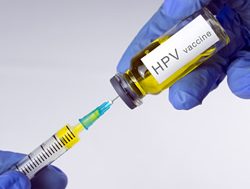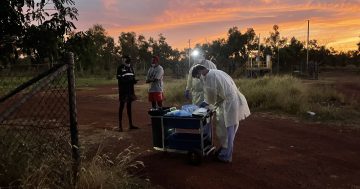Olivia Willis says vaccination is a safe and effective way to protect ourselves from flu, but doctors are warning against getting the flu shot too early in the season.
By Olivia Willis*
 It’s nearly time to roll up your sleeve, brace yourself for a small prick, and hope the nurse or doctor offers you a lollypop for your troubles.
It’s nearly time to roll up your sleeve, brace yourself for a small prick, and hope the nurse or doctor offers you a lollypop for your troubles.
The annual flu vaccine will soon roll out across general practices, pharmacies, community health clinics and some workplaces and schools.
In some pharmacies, the flu vaccine is already on offer.
But the Australian Medical Association (AMA) has urged people to hold off on getting this year’s vaccine, warning some pharmacies are offering vaccinations too early.
“We are concerned when pharmacies are out there advertising early flu shots at a time that might not be clinically appropriate,” AMA National President, Dr Michael Gannon told ABC News.
“People who are vaccinated too early in autumn might have lost protection by late in the spring when the virus has mutated.”
So, when is the right time to get your flu shot?
And is it necessary for everyone?
Getting immunised
The Australian Government recommends everyone wishing to protect themselves against the flu should get immunised, from the age of six months on.
Vaccination is a safe and effective way to protect yourself from flu; people who get vaccinated are at lower risk of getting an infection (and developing serious disease) than those who do not.
Dr Bastian Seidel, President of Royal Australian College of General Practitioners (RACGP), said it’s important for people to get vaccinated whether they are healthy or at high risk.
“Every year thousands of Australians are dying or being admitted to hospital for complications of the flu,” Dr Seidel said.
“That is entirely avoidable if people have their flu vaccination.”
Getting a flu shot also means you help to protect other people, including those who are too sick or too young to be vaccinated, as well as vulnerable groups such as babies, people over 65 years and pregnant women.
The more people who are vaccinated in the community, the less likely the flu will spread.
It’s free for those at risk
Under the Federal Government’s National Immunisation Program, there are some people who are eligible for a free flu vaccine because they are most at risk of poor outcomes.
This includes:
- Pregnant women (at any stage of pregnancy).
- People aged 65 years and older.
- Aboriginal and Torres Strait Islander children aged six months to five years.
- Aboriginal and Torres Strait Islander people aged 15 years and older.
- People aged six months and over with medical conditions that mean they have a higher risk of getting serious disease (such as diabetes, severe asthma, lung or heart disease).
Several State and Territory Governments are also offering free flu jabs to children between six months and five years old, including in NSW, Victoria, Western Australia and the ACT.
Dr Gannon says vaccination rates among small children and pregnant women are particularly low in Australia.
“It’s one of the worst performing areas,” Dr Gannon said.
“Only around 50 per cent of pregnant women get the vaccine, and we think that’s an appallingly low number.”
“It’s no exaggeration to say that you’re potentially risking the life of yourself and your baby if you don’t get the vaccine.”
In most cases the flu vaccine is available through your local GP.
Immunisation services can also be accessed at community health clinics, Aboriginal Medical Services, through school-based immunisation programs, and at some pharmacies and workplaces.
When to get the jab
The best time to get the flu jab can be difficult to predict because the peak period of flu activity varies year by year, said Professor Raina MacIntyre from the University of NSW.
“Generally, the peak flu season is around July and August, but it’s variable — sometimes it can start in May, and sometimes the peak happens in September,” Professor MacIntyre said.
This is important because research shows the effectiveness of the flu vaccine may begin to wane after three to four months.
“It’s a trade-off really, between getting the ideal immunity [early on] and not missing the peak of flu activity,” Professor MacIntyre said.
According to the Department of Health, the Government-funded seasonal flu vaccines will be available nationally from mid April.
This matches recommendations from both the AMA and the RACGP, who say the best time to get the flu shot is towards the end of April and into the beginning the May.
“This should really cover the vast majority of Australians,” Dr Seidel said.
Dr Gannon agreed, and said healthy people should get vaccinated at the same time as those eligible for a free vaccination.
“There’s no question that the optimal time to receive the influenza vaccination is in late April and early May,” Dr Gannon said.
It doesn’t provide total protection
The flu vaccine doesn’t provide complete protection, but any prevention is better than no prevention, Professor MacIntyre said.
“In healthy adults, [the vaccine] should be 60 to 70 per cent effective, which is pretty good,” she said.
For people with impaired immunity — such as older people and those with chronic illness — the vaccine is less effective and doesn’t elicit such a strong immune response.
“To improve the protection in older people, the Government’s introduced two new vaccines just for people 65 years and over, which are more potent than the regular flu vaccine,” Professor MacIntyre said.
The new enhanced vaccines are specifically targeted at the strains that were prevalent in last year’s deadly flu outbreak.
Getting vaccinated every year is important because the most common strains of the influenza virus change every year.
“So the vaccine that you get this year won’t necessarily protect you against the different virus that may be circulating next year,” Professor MacIntyre said.
If you are in a high-risk category or have concerns or questions about the flu vaccine this year, it’s best to speak with your GP, Dr Seidel said.
“They can very specifically give you advice that works best for you,” he said.
* Olivia Willis is a journalist and radio producer in the ABC’s Science and Health Unit. She tweets at @liv_willis.
This article first appeared at www.abc.net.au.










